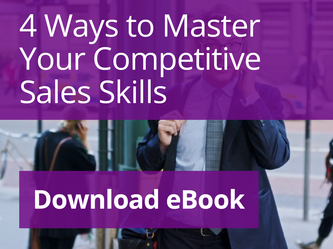How To Position Yourself Against the Competition
Sales Tips | advantage stories | positioning | customer reactions
Positioning yourself against the competition as a seller is crucial to helping you get meetings and close deals, but it can be difficult to know where to start.

There are four things you want to keep in mind:
1. Focus on telling, not selling
Imagine that a prospect asks you, "What makes you guys different than these competitors of yours that I have already been talking to and/or working with?"
The most common reaction for many sellers at that moment is to not only try to distinguish between their company and the competition but at the same time, persuade the customer that their company is really better, not just different.
That's selling.
Customers need to be able to hear the actual differences. They can then decide for themselves which is better.
Obviously, there’s a subtlety to this because, in fact, you do want the person to think favorably about you and your offering.
So how do you go about doing that?
Talk about areas where your company is absolutely, positively unique in your industry. Also talk about areas where you do something that others also do, only you do it a little differently than they do it.
So first you might say: Nobody else does __________. (If you do have a first-mover advantage, that's ideal.)
And then you could add: We do it in color, and not everyone does that. We do it in multiple languages, because we work globally. We do it 24 hours a day, because we have clients who operate in all kinds of different time zones.
But notice that you need to focus on what makes you different and resist the temptation to start talking about why that makes you better.
The customer might not need color. The customer might not care about multiple languages. He or she might have no interest whatsoever in being able to reach you 24 hours a day.
Make sure you have a bullet point list of differences waiting.
Customers will much more easily remember a few points instead of trying to pick out what’s important from a long drawn out monologue.
2. Advantages
Maybe you're wondering, "What do I do if the prospect ASKS me about the advantages we have over the competition?"
Here, you do have an opportunity to state what makes you better, but you still have to be careful.
When the customer asks, "What makes you better?", what they’re really asking is, "Why would somebody working for a company just like mine, in a position just like mine, think that your company’s better? Not why do you, Mr. Salesperson, who is obviously paid to say you’re better in any given situation, think you're better."
You must tell a story.
You want to be able to tell a story that brings that benefit to life from the other person's perspective.
You should say something along the lines of: "Well, let me tell you why a company like yours prefers a company like ours. Let me tell you why your counterparts in this other company or this other industry, is one of our happy customers."
Ideally you want to have a story that matches up with every kind of customer you have and every kind of prospect that you’re going to meet, since the kind of story that works for one person or one organization isn’t going to work for everyone.
3. Umbrella versus specialist
Maybe your company provides services over a wide range, so you’re able to pitch the idea of one-stop shopping. Basically, you say, "You come to us and we take care of everything, soup to nuts. We handle everything and you get one bill."
In this model, everything falls under one umbrella. There’s only one team for the customer to work with, there's one point of contact, and obviously, there are some advantages in efficiency and simplicity.
And while all of that’s true, there’s also a specialist argument that you need to understand.
A smaller company that only does one of those things is more of a specialist.
This is something they might say: "Well see, the big companies, they will claim to provide services from start to finish, but the reality is that they can’t possibly have a best-in-class specialist working in every single division of their company. We don’t try to be all things to all people. We try to be really great in this one thing. We’re built around doing that one thing really well. So if doing this one thing really well is important to you, then you want to go with a company like us."
So if you’re an umbrella company, you’re spinning “the one” argument, but if you’re a specialist, you’ve got to approach it from another angle and explain the advantages of the unique specialty that you have.
4. Migration strategy
This is a case where you’re in a kind of a horse race with your competitors.
Depending on the week you ask, they may tell the customer they’ve got a slightly more advanced product than you. Next week, you’ve got a slightly more advanced product than them.
When you’re talking to a customer at any given moment, a competitor might have already reached out to him or her, showing them their ever-so-slightly better version of something.
So how do you deal with that?
Well, one way is to say, "Mr. Prospect, we’ve been in this business for x years, and over time our mission has always been to be the number one company. And so if you work with us, what you’re working with is a company that's committed to a migration strategy. We are all about progress, about migration, about moving on. Our strategy is always about advancing the goalpost of quality of service that we render. Therefore, if you work with us, as we advance and we bring our clients to a new standard, a new level of excellence, you’re always consistently working with a company, that is at the top."
"Now, is that to say that there isn’t a company that occasionally, for five minutes, tries to beat us and has something that works a little faster, a little better, a little cleaner, a little cheaper? Maybe for a moment. But when you stay with us over time, you will consistently have the most proven, tested, best-in-class service, because we always learn from anybody that slightly gets ahead of us for a moment, and then we set the bar a little higher."
"So our goal is to constantly change, advance, and improve, and the evidence for our success with that is pretty clear. If you look at where our product set is now, versus where it was a year ago, you see tremendous growth. And I can go back x years and show you other companies that, once they develop something, they’re kind of stuck with that. So our company is not about where we are stuck and how we can maintain the status quo. It’s about where we’re going to be tomorrow."
Positioning yourself against the competition is a crucial element of your discussion with any prospect. How have you mastered your positioning?
About Steve Bookbinder
Steve Bookbinder is the CEO and sales expert at DMTraining. He has delivered more than 5,000 workshops and speeches to clients all over the world and has trained, coached, and managed more than 50,000 salespeople and managers. Steve continuously refreshes his training content to reflect his latest first-hand observations of salespeople across industries and regions. Through him, participants in his workshops and coaching sessions learn the best practices of today’s most successful sellers and managers across industries. Steve understands that sales is a competitive game. To outperform competitors and our own personal best results, we need to out-prospect, out-qualify, out-present and out-negotiate everyone else, not merely know how to sell. Through his specialty programs in Pipeline Management, Personal Marketing, Great First Meetings, 2nd-level Questioning, Sales Negotiating, and Sales Coaching, Steve trains sales teams to master the skills they need to overcome the challenges they face in today’s world… and keep improving results year over year.




